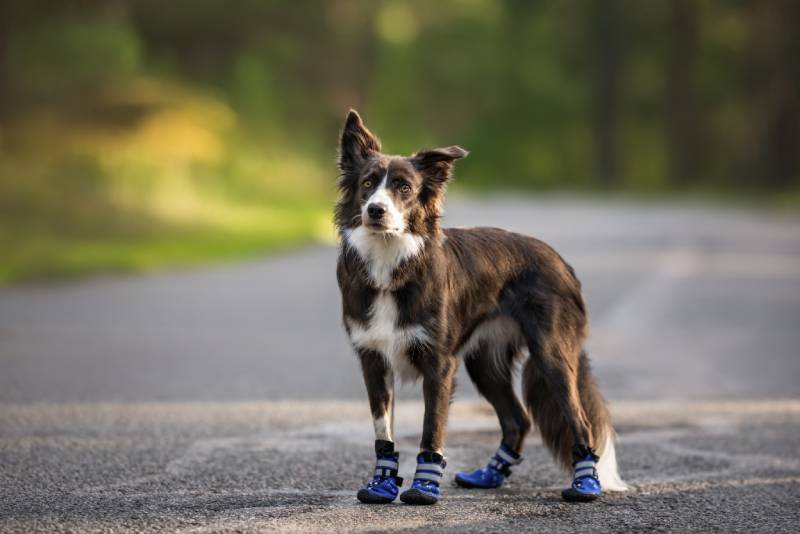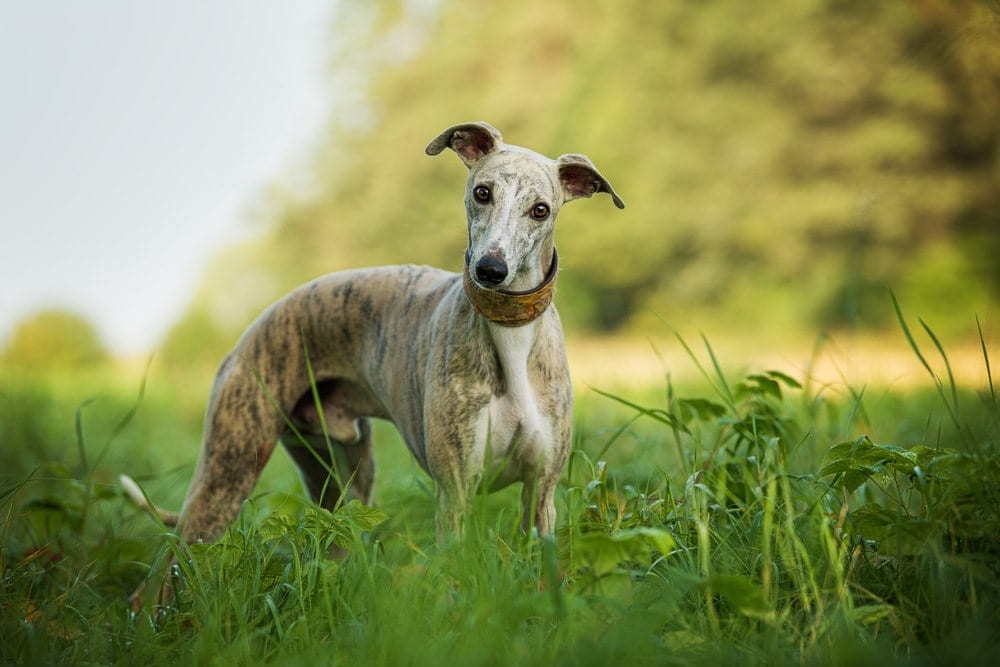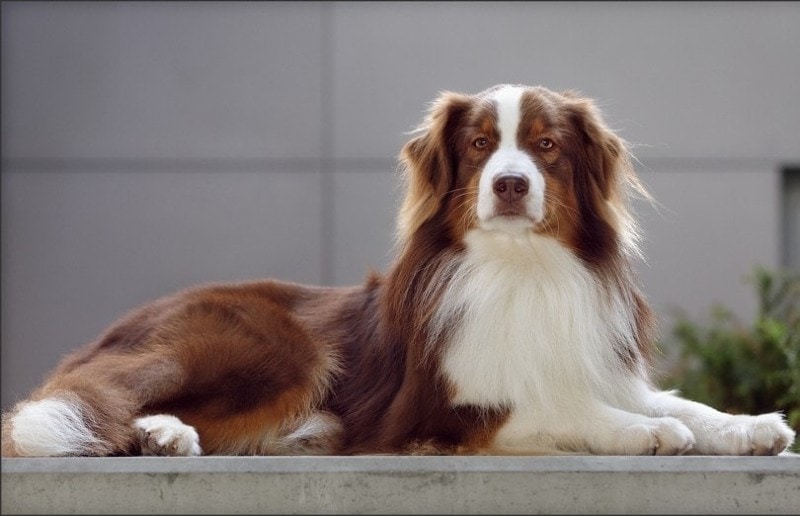Finding the right canine companion is a priority for many moving to the fulfilling life of a digital nomad. Having reliable company is crucial in staving off occasional boredom and isolation. While most people will likely be unwilling to co-sign on the traveling lifestyle, almost any dog will be eager to jump on board.
But that doesn’t mean every dog will mesh with a mobile way of life. It takes a certain stature and personality to succeed with limited space, and you and your canine companion will have a more satisfying experience when you consider the type of pup you want riding shotgun.
Although many are better suited for a house, several kinds of dogs can adapt to van life. Here’s a look at the 10 best dog breeds to take on the road.
The 10 Best Dog Breeds for Van Life
1. Brittany

| Lifespan | 12–14 years |
| Height | 17.5–20.5 inches |
| Weight | 30–40 pounds |
Brittanys are a beautiful and practical breed for living in a van. Traditionally, they were hunting dogs, boasting an intelligence, build, and eagerness to please that made them perfect for pointing and retrieving. They’re athletic, exuberant, and energetic companions, which is an excellent match if you lead an active life.
Brittanys enjoy being around people and are unlikely to become aggressive with strangers or other animals. They do well off the leash with quality training. They’re intelligent and enjoy jobs but aren’t overly demanding for mental stimulation.
Regular brushing of their short–medium hair and an occasional bath is generally all they need. Although not hypoallergenic, they don’t shed much fur, making them easy to clean behind and care for on the road.
2. Jack Russell Terrier

| Lifespan | 12–14 years |
| Height | 10–12 inches |
| Weight | 9–15 pounds |
Jack Russell Terriers might be the most well-rounded dog for van life. They’re small enough to take up nominal space but athletic and big enough to get in and out of the van without help or risk of injury. Despite being small, these sturdy and bold dogs have no problem keeping up on the hiking trail either.
Changing routines and scenery that come with van life won’t bother Jack Russell Terriers, and they’re generally friendly around strangers. A well-socialized and trained Jack Russell is crucial, as the breed can be aggressive with other dogs.
Since they’re curious and alert, they will likely get vocal when sensing a possible threat. Jack Russell Terriers are an intelligent and entertaining breed with the perfect energy level, confidence, and build to thrive on the road.
3. Border Collie

Shutterstock
| Lifespan | 12–14 years |
| Height | 17.5–20.5 inches |
| Weight | 30–40 pounds |
Border Collies have loads of energy, so while they won’t make great apartment dwellers, they can flourish with room to run and explore wherever your van stops. Short-haired smooth-coat varieties are preferable, in many cases, due to their easier upkeep and lower shedding. As what many agree to be the smartest of all dog breeds, they are highly adaptable and well-mannered off the leash with proper training.
Their smarts also make Border Collies a challenging breed, as they can test their owners and become difficult when they don’t have enough physical or mental stimulation. Training is critical, and first-time owners may find them overwhelming. But when you give them a job to perform and adequate exercise, these loyal dogs can make excellent travel companions.
4. Cocker Spaniel

| Lifespan | 10–14 years |
| Height | 13.5–15.5 inches |
| Weight | 20–30 pounds |
Cocker Spaniels are intelligent, active, well-mannered, and gentle around almost everyone. It’s a delightful temperament to have on board at all times and one you don’t need to worry about with proper training and socialization.
From a practical standpoint, Cocker Spaniels are a suitable medium size with an athletic build. They’re perfect for transporting around but also able to keep up when you’re adventuring outside. A hunting background makes them easy to train and adaptable for a life on the road with their owner.
5. Whippet

| Lifespan | 12–15 years |
| Height | 18–22 inches |
| Weight | 25–40 pounds |
The Whippet is like a portable workout coach; it’s a compact dog that can reach astonishing speeds, having no problem keeping up with runners and bikers living an active lifestyle. Watch out for the strong prey drive, which requires substantial training to subdue.
Whippets don’t need much space in the van, and their grooming needs are minimal. The thin coat is limiting because they don’t tolerate cold weather well. And although they don’t bark much, they need an environment as peaceful as their temperament to avoid stress, which shouldn’t be too challenging for many van dwellers.
6. Chihuahua

| Lifespan | 14–16 years |
| Height | 5–8 inches |
| Weight | 3–6 pounds |
Although they’re not ideal for the intensive mountain hike, few breeds are more portable than the Chihuahua. The cute and loyal lap dogs have minimal demands, require little space to accommodate them or their accessories, and only need basic grooming to maintain their low-shedding coat.
Chihuahuas sport a spitfire personality, a people-loving and charming character, and a strong will and attitude. They’re energetic and alert. You’ll hear a lot of barking if they sense a stranger nearby, which could be reassuring while living in a van.
7. Australian Shepherd

| Lifespan | 12–15 years |
| Height | 18–23 inches |
| Weight | 40–65 pounds |
Australian Shepherds don’t rank as high on the intelligence scales as their herding brethren, the Border Collies, but not much differentiates the two on the road. The breed is spritely and agile with an acumen for training. They get along with others but maintain a protective instinct, making them serviceable watchdogs.
With the Australian Shepherd, you gain a loyal, affectionate, and attentive dog when you can give them games and outdoor activities to burn off energy. They love having a job and must stay busy to avoid destructive behaviors. If you can provide the stimulation they demand and manage their moderate grooming needs, these pups are exceptional road dogs to bring along.
8. Labrador Retriever

| Lifespan | 11–13 years |
| Height | 21.5–24.5 inches |
| Weight | 55–80 pounds |
A Labrador Retriever will put a smile on anyone’s face, offering a seemingly boundless lovable spirit. Your dog will gladly socialize with other people and animals at the campsite, perhaps acting as the social lubricant you need to meet fellow travelers.
Labs are established, well-rounded hunting and working dogs. They shed a decent amount of hair and take up considerable space, so they are not for every active individual. But as adaptable and high-energy dogs, they’ll be more than willing to go on adventures if there’s room.
9. Dachshund

| Lifespan | 12–16 years |
| Height | 8–9 inches |
| Weight | 6–32 pounds |
Like the Chihuahua, the Dachshund is a conveniently portable pup with its slight stature and meager requirements for food and space. Dachshunds can be more laid back than other undersized dogs but are still full of life, courage, and curiosity.
Dachshunds often need help in and out of the van to save their knees and long back, and they’re unlikely to put up with intense wilderness excursions. But that doesn’t mean they won’t keep you active. They’re great with other dogs and will be a joy to play with around the van. Barking and shedding come with the territory, but you won’t regret having their effervescent personality and adorable looks on board.
10. Border Terrier

| Lifespan | 12–15 years |
| Height | 12–15 inches |
| Weight | 11.5–15.5 pounds |
Terriers are excellent van life dogs in general, and the Border Terrier is one of the best representatives of the group. They’re hardy and adaptable and fit for regularly changing outdoor scenery. Grooming and shedding are relatively easy to manage, and they’re perfectly sized to keep up with you outdoors without needing much space inside.
Border Terriers have the affection and energy to suit various van lifestyles. You can take them to the city or the wilderness. With the right amount of activity and proper training to keep them from running off or becoming antsy, your pup will be a content and compliant travel buddy.
What Makes a Dog Good for Van Life?
Van life can have many meanings and take place in any locale. There are a million ways to define your lifestyle, from hanging out on the beach to hiking the country’s tallest mountains, and that can determine which breeds will be best for you.
At the same time, all dogs are unique, so there’s never a 100% chance of accurately guessing how one will operate on the road by its breed alone. Nevertheless, there are desirable traits that are either easy to spot or common enough to certain breeds for you to make a sensible decision.
- Friendly to people and pets
- Confident and outgoing
- Trainable and intelligent
- Small–medium size
- Low-maintenance coat
- Build and coat to suit your climate
Training will be essential before embarking with your new travel companion. There are only a few fenced-in areas outside the home. Even with a long leash while outdoors, there’s still a chance they could escape.
Poorly socialized dogs or those with dodgy recall may have issues at a new site. Meanwhile, anxious dogs can become overly stressed from unfamiliar locations or being left alone in the van. Picking a breed with a fitting temperament will simplify training, but you must work diligently to ensure they’ll be happy and safe on the road no matter which dog you have.
What Will My Dog Need in the Van?
Dogs can adapt surprisingly well to a mobile and relatively cramped lifestyle, but they’ll always have some basic requirements in any situation. Considering those needs in the context of a van will keep you from dealing with unnecessary frustrations while making your dog happy.
- Comfortable dog bed
- Waterproof blankets
- Lengthy leash to attach to the van or ground screw
- Spill-proof collapsible dog bowls
- High-quality portable fan
- First-aid kit
- Several dog toys
- Grooming and tick removal tools
Give your dog a comfortable collar with your contact information, and update your phone number with your dog’s microchip registry. Going one extra step, a GPS attachment will cover all your bases if you’re worried about losing your dog.
Avoid leaving your dog in the van for too long by themselves. Consider outfitting your van with appropriate insulation and cooling/heating equipment to keep your dog comfortable during quick trips out.
Take advantage of the community around you when you need help watching your dog for longer stretches. Use Rover.com or research nearby doggy daycares to find someone local that might care for your pup for extended periods, such as when you’re at work.

Conclusion
Dogs make marvelous travel companions, saving their owners from the occasional swells of dull isolation and keeping their motors going. But with the benefits comes even more responsibility.
Your dogs are your children at home and on the road. It takes adjustment and sacrifice to jump to van life, and you’ll have to make even more changes when you add a dog to the mix. Sharing van life with a dog is not a simple decision, and pups deserve every consideration and accommodation. However, when you put in the effort and plan accordingly, your dog will make the experience all the more satisfying.
Related article:
Featured Image Credit: View Apart, Shutterstock












